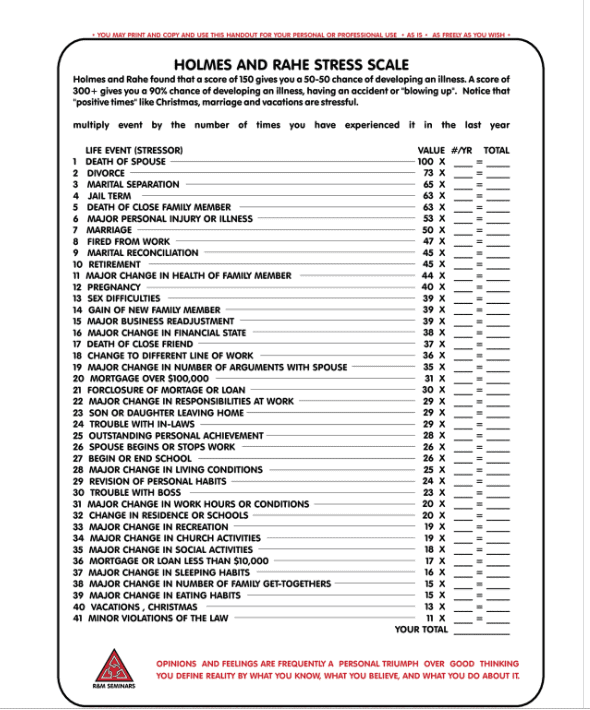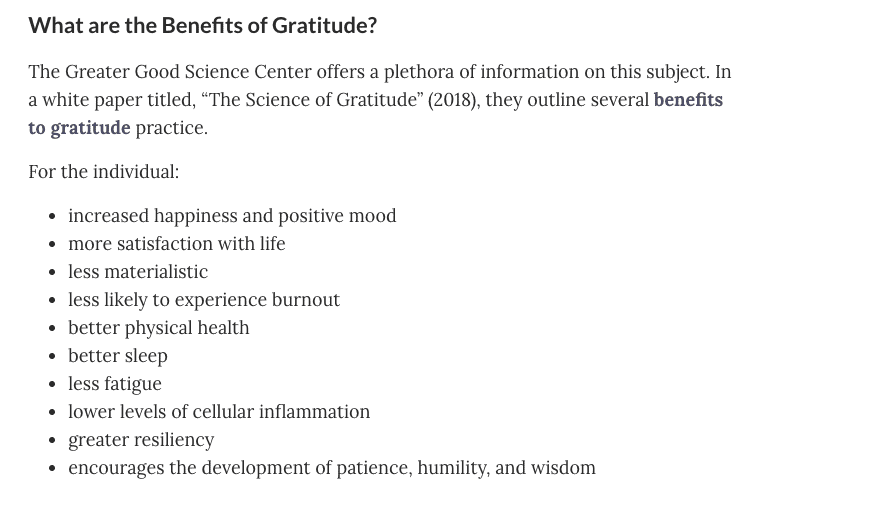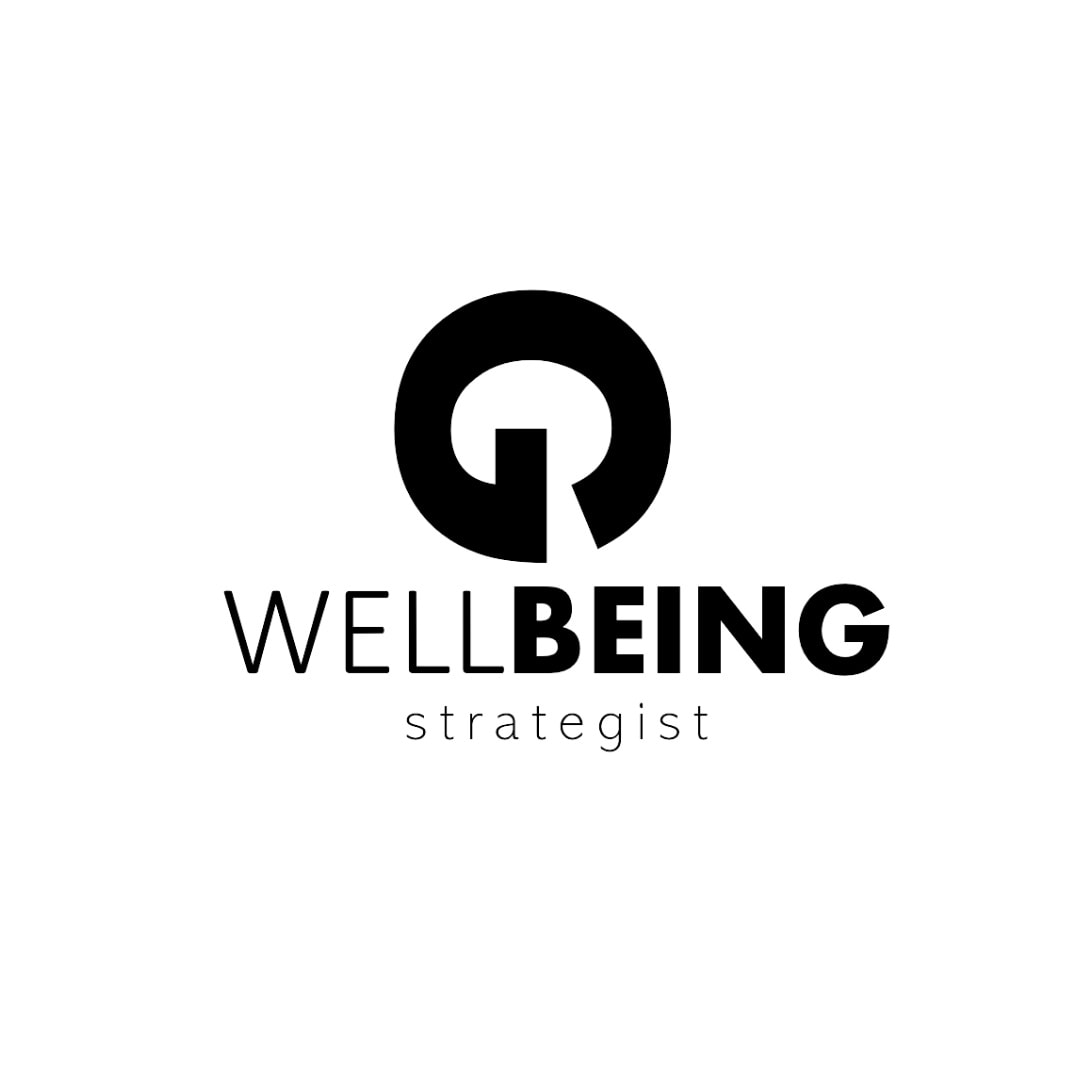The process of career transition is stressful. Just the thought of career change alone can cause stress, anxiety, and self-doubt.
According to the Centre for Studies on Human Stress, stress occurs when we are faced with, or anticipate, a situation that is either new or unpredictable, when we feel we have little or no control in a situation or when our competence is called into question. In less formal terms, we feel stressed when we feel that “things are out of our control.”
In 1967, psychiatrists Thomas Holmes and Richard Rahe developed the Life Stress Assessment Scale, which is indicating how different types of stress generating events can lead to developing an illness.
The researchers discovered that work-related changes such as being fired, retirement, or major business readjustments belong to one of the most stressful events in life, just like experiencing the death of a close family member, going through a divorce or experiencing major personal injury or illness.

A career change may be exciting for some, but can be a source of major stress for others.
Ultimately, it’s not just a career change, it’s also a life change. It affects our lifestyle as a whole. Particularly when we talk about international careers, such as working in the Middle East as a cabin crew or at any other position in aviation or in hospitality.
Career change is not simply changing a job, you need to manage the entire move, relocation process, finding a new places to live, building new friendships and professional relationships.
Why is it so hard?
Stress affects self-esteem, relationships with others and the self, sleep, and quality of life in general. There are real worries of social or societal pressure, financial strain, material well-being, and even loss of personal identity. It can be an upheaval of our routine and the structure of our lives.
I remember when I relocated back to Europe after over 10 years in the Middle East and was in transition period, getting ready to build my own business. I was attending networking events and conferences when people asked me what am I doing, I was telling them what I had been doing back in Qatar, as if I didn’t realize I am in another country, taking the next career step.
Our identity can be brittle, we have to take extra care not to be drowned into negative self-talk or self-doubt.
Somebody told me: „ It is this ANTICIPATION of what MIGHT happen that causes the biggest stress of all.’ Perhaps it is true.
How is it possible that we are capable of wanting a change in our life and being afraid of it at the same time?
“ When I think about my current job situation I feel stabbing chest pain and I can’t sleep even in the middle of the night. The stress level is comparable with experience of loosing somebody close.” – I heard from my client this week.
Career change is a process and sometimes building something new requires strength to overcome pain, sorrow, and fear in order to create something new, better and lasting.
HOW TO HANDLE STRESS DURING YOUR CAREER TRANSITION?
Scientific approach
Researchers Higgins and Endler (1995) grouped coping strategies into three main classes:
- task-oriented,
- emotion-oriented,
- avoidance-oriented.
The task-oriented strategy is problem-focused. It involves taking direct action to alter the situation itself to reduce the amount of stress it evokes. Examples: problem-solving, time- management, obtaining instrumental social support.
In the emotion-oriented strategy, efforts are directed at altering emotional responses to stressors. It also includes attempts to reframe the problem in such a way that it no longer evokes a negative emotional response and elicits less stress (Mattlin, 1990). Examples: drug therapy, distraction, e.g. keeping yourself busy to take your mind off the issue, meditation, praying, eating comforting food, drinking alcohol, journaling, such are gratitude diary.
Finally, avoidance-oriented coping includes strategies such as avoiding the situation, denying its existence, or losing hope (Lazarus & Folkman, 1984). It also includes the use of indirect efforts to adjust to stressors by distancing oneself, evading the problem, or engaging in unrelated activities for the purpose of reducing feelings of stress (Roth & Cohen, 1986). Examples: going to the cinema, meeting with friends instead of spending time on working towards solving a problem.
You may also like: Build resilience. 5 secrets backed up by science.
Practical approach.
Below I describe a few techniques that worked for me in the past.
1.Create a supportive environment
Stick to friends who always support you, even if they are miles away. With the help of today’s technology sky is the limit.
I have been going through some difficulties at the time I was based in Hawaii. My friend Kasia, even though she was in another state and in a different time zone managed to offer me big support at that time. She would conduct a guided meditation for me, on the phone, while I was in bed, till I fell asleep.
2.Maintain a positive mindset
Positive thinking can reduce your stress level, help you feel better about yourself (and the situation) and improve your overall well-being and outlook.
All you need is the right tools to do that.
Whenever your mind plays tricks with you, producing negative or self-doubting thoughts, take a conscious effort to replace a negative thought with a positive one.
Questions such as: “How does it get any better than this?” used in response to both positive and negative situations can work wonders.
In response to a positive situation, it puts you in a state of gratitude, which is known to reduce stress. In response to a negative occurrence, it redirects thinking into focusing on taking action and looking for solutions.

Building positive mindset can be a lengthy and complex process, especially if you are on your own or do not where to start. Deal With Culture may help.
In the upcoming online course BUILD RESILIENCE you can learn practical tools for developing positive mindset, managing your emotions and moving forward in your life.
3.Have an action plan
Even when you know where you are going but do not have a plan how to make it happen you may get lost on your way.
A good action plan will have particular steps of your journey defined, it will give you an idea of how much time you need to complete your action and what is needed. You may need to obtain particular skills, certificates, perhaps a network of people.
Make sure you keep a visual reminder of your goal. You may create a vision board, stick a picture on your fridge, or next to your mirror in the bedroom or by the computer you are using daily. The idea is to have a reminder of what you are currently working on and the visual of a final destination or final outcome of your actions.
4. Exercise will improve your mood
Working out regularly is one of the best ways to relax your body and mind.
“The mental benefits of aerobic exercise have a neurochemical basis. Exercise reduces levels of the body’s stress hormones, such as adrenaline and cortisol. It also stimulates the production of endorphins, chemicals in the brain that are the body’s natural painkillers and mood elevators. Endorphins are responsible for the “runner’s high” and for the feelings of relaxation and optimism that accompany many hard workouts — or, at least, the hot shower after your exercise is over.
Behavioral factors also contribute to the emotional benefits of exercise. As your waistline shrinks and your strength and stamina increase, your self-image will improve. You’ll earn a sense of mastery and control, of pride and self-confidence. Your renewed vigor and energy will help you succeed in many tasks, and the discipline of regular exercise will help you achieve other important lifestyle goals.”- Harvard Health Publishing

Need help getting the job done?
Changing your career generate many questions and doubts. If you are looking for an exclusive retreat where you can learn life-changing techniques from international trainers, learn more about BUILD YOUR INNER FEED Retreat.








